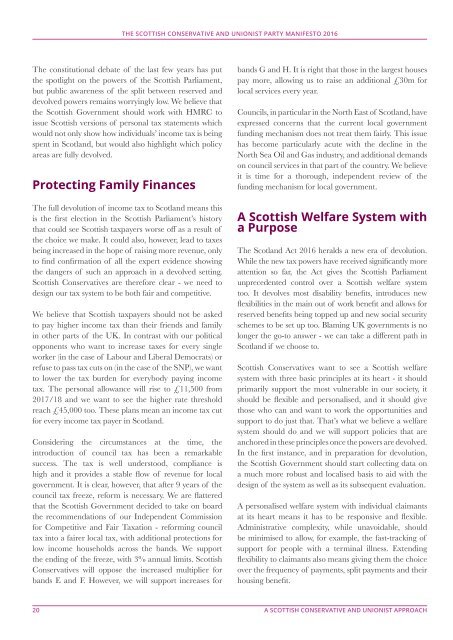A STRONG OPPOSITION - A STRONGER SCOTLAND
Scottish-Conservative-Manifesto_2016-DIGITAL-SINGLE-PAGES
Scottish-Conservative-Manifesto_2016-DIGITAL-SINGLE-PAGES
Create successful ePaper yourself
Turn your PDF publications into a flip-book with our unique Google optimized e-Paper software.
THE SCOTTISH CONSERVATIVE AND UNIONIST PARTY MANIFESTO 2016<br />
The constitutional debate of the last few years has put<br />
the spotlight on the powers of the Scottish Parliament,<br />
but public awareness of the split between reserved and<br />
devolved powers remains worryingly low. We believe that<br />
the Scottish Government should work with HMRC to<br />
issue Scottish versions of personal tax statements which<br />
would not only show how individuals’ income tax is being<br />
spent in Scotland, but would also highlight which policy<br />
areas are fully devolved.<br />
Protecting Family Finances<br />
The full devolution of income tax to Scotland means this<br />
is the first election in the Scottish Parliament’s history<br />
that could see Scottish taxpayers worse off as a result of<br />
the choice we make. It could also, however, lead to taxes<br />
being increased in the hope of raising more revenue, only<br />
to find confirmation of all the expert evidence showing<br />
the dangers of such an approach in a devolved setting.<br />
Scottish Conservatives are therefore clear - we need to<br />
design our tax system to be both fair and competitive.<br />
We believe that Scottish taxpayers should not be asked<br />
to pay higher income tax than their friends and family<br />
in other parts of the UK. In contrast with our political<br />
opponents who want to increase taxes for every single<br />
worker (in the case of Labour and Liberal Democrats) or<br />
refuse to pass tax cuts on (in the case of the SNP), we want<br />
to lower the tax burden for everybody paying income<br />
tax. The personal allowance will rise to £11,500 from<br />
2017/18 and we want to see the higher rate threshold<br />
reach £45,000 too. These plans mean an income tax cut<br />
for every income tax payer in Scotland.<br />
Considering the circumstances at the time, the<br />
introduction of council tax has been a remarkable<br />
success. The tax is well understood, compliance is<br />
high and it provides a stable flow of revenue for local<br />
government. It is clear, however, that after 9 years of the<br />
council tax freeze, reform is necessary. We are flattered<br />
that the Scottish Government decided to take on board<br />
the recommendations of our Independent Commission<br />
for Competitive and Fair Taxation - reforming council<br />
tax into a fairer local tax, with additional protections for<br />
low income households across the bands. We support<br />
the ending of the freeze, with 3% annual limits. Scottish<br />
Conservatives will oppose the increased multiplier for<br />
bands E and F. However, we will support increases for<br />
bands G and H. It is right that those in the largest houses<br />
pay more, allowing us to raise an additional £30m for<br />
local services every year.<br />
Councils, in particular in the North East of Scotland, have<br />
expressed concerns that the current local government<br />
funding mechanism does not treat them fairly. This issue<br />
has become particularly acute with the decline in the<br />
North Sea Oil and Gas industry, and additional demands<br />
on council services in that part of the country. We believe<br />
it is time for a thorough, independent review of the<br />
funding mechanism for local government.<br />
A Scottish Welfare System with<br />
a Purpose<br />
The Scotland Act 2016 heralds a new era of devolution.<br />
While the new tax powers have received significantly more<br />
attention so far, the Act gives the Scottish Parliament<br />
unprecedented control over a Scottish welfare system<br />
too. It devolves most disability benefits, introduces new<br />
flexibilities in the main out of work benefit and allows for<br />
reserved benefits being topped up and new social security<br />
schemes to be set up too. Blaming UK governments is no<br />
longer the go-to answer - we can take a different path in<br />
Scotland if we choose to.<br />
Scottish Conservatives want to see a Scottish welfare<br />
system with three basic principles at its heart - it should<br />
primarily support the most vulnerable in our society, it<br />
should be flexible and personalised, and it should give<br />
those who can and want to work the opportunities and<br />
support to do just that. That’s what we believe a welfare<br />
system should do and we will support policies that are<br />
anchored in these principles once the powers are devolved.<br />
In the first instance, and in preparation for devolution,<br />
the Scottish Government should start collecting data on<br />
a much more robust and localised basis to aid with the<br />
design of the system as well as its subsequent evaluation.<br />
A personalised welfare system with individual claimants<br />
at its heart means it has to be responsive and flexible.<br />
Administrative complexity, while unavoidable, should<br />
be minimised to allow, for example, the fast-tracking of<br />
support for people with a terminal illness. Extending<br />
flexibility to claimants also means giving them the choice<br />
over the frequency of payments, split payments and their<br />
housing benefit.<br />
20 A SCOTTISH CONSERVATIVE AND UNIONIST APPROACH


